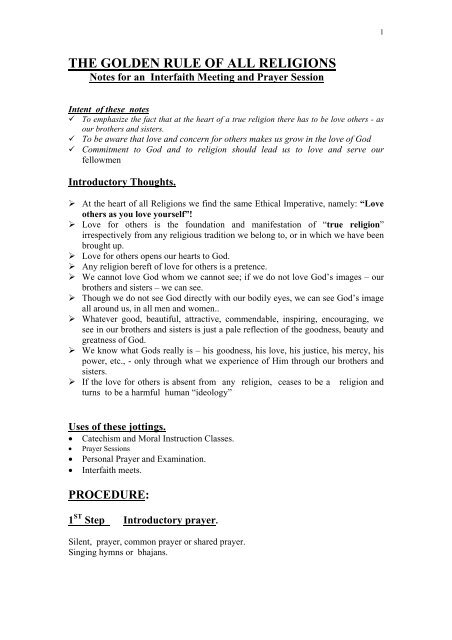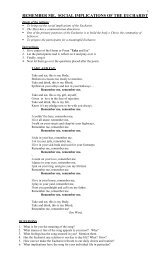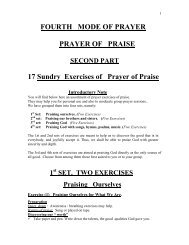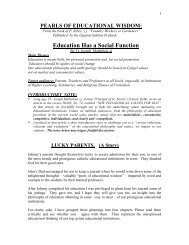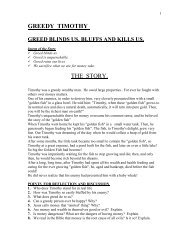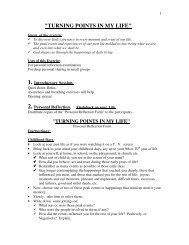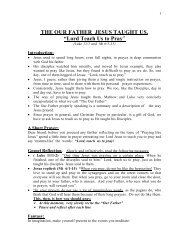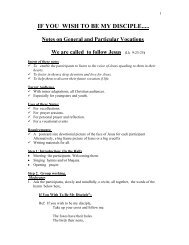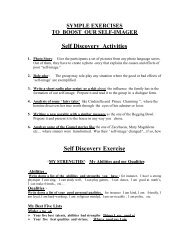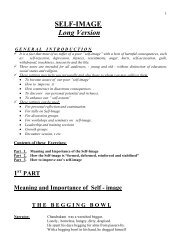Love others as you love yourself
Love others as you love yourself
Love others as you love yourself
You also want an ePaper? Increase the reach of your titles
YUMPU automatically turns print PDFs into web optimized ePapers that Google loves.
THE GOLDEN RULE OF ALL RELIGIONS<br />
Notes for an Interfaith Meeting and Prayer Session<br />
Intent of these notes<br />
To emph<strong>as</strong>ize the fact that at the heart of a true religion there h<strong>as</strong> to be <strong>love</strong> <strong>others</strong> - <strong>as</strong><br />
our br<strong>others</strong> and sisters.<br />
To be aware that <strong>love</strong> and concern for <strong>others</strong> makes us grow in the <strong>love</strong> of God<br />
Commitment to God and to religion should lead us to <strong>love</strong> and serve our<br />
fellowmen<br />
Introductory Thoughts.<br />
At the heart of all Religions we find the same Ethical Imperative, namely: “<strong>Love</strong><br />
<strong>others</strong> <strong>as</strong> <strong>you</strong> <strong>love</strong> <strong>you</strong>rself”!<br />
<strong>Love</strong> for <strong>others</strong> is the foundation and manifestation of “true religion”<br />
irrespectively from any religious tradition we belong to, or in which we have been<br />
brought up.<br />
<strong>Love</strong> for <strong>others</strong> opens our hearts to God.<br />
Any religion bereft of <strong>love</strong> for <strong>others</strong> is a pretence.<br />
We cannot <strong>love</strong> God whom we cannot see; if we do not <strong>love</strong> God’s images – our<br />
br<strong>others</strong> and sisters – we can see.<br />
Though we do not see God directly with our bodily eyes, we can see God’s image<br />
all around us, in all men and women..<br />
Whatever good, beautiful, attractive, commendable, inspiring, encouraging, we<br />
see in our br<strong>others</strong> and sisters is just a pale reflection of the goodness, beauty and<br />
greatness of God.<br />
We know what Gods really is – his goodness, his <strong>love</strong>, his justice, his mercy, his<br />
power, etc., - only through what we experience of Him through our br<strong>others</strong> and<br />
sisters.<br />
If the <strong>love</strong> for <strong>others</strong> is absent from any religion, ce<strong>as</strong>es to be a religion and<br />
turns to be a harmful human “ideology”<br />
Uses of these jottings.<br />
• Catechism and Moral Instruction Cl<strong>as</strong>ses.<br />
• Prayer Sessions<br />
• Personal Prayer and Examination.<br />
• Interfaith meets.<br />
PROCEDURE:<br />
1 ST Step Introductory prayer.<br />
Silent, prayer, common prayer or shared prayer.<br />
Singing hymns or bhajans.<br />
1
2 ND Step Reading and pondering The Sacred Texts<br />
Quotes taken from the Sacred Books of all Major Religions<br />
The major religions of the world have at the center of their moral teaching a<br />
simple statement which h<strong>as</strong> come to be called the “Golden Rule”<br />
Considering the variety of backgrounds, beliefs, languages and cultures of the<br />
various world religions it is remarkable that their core teaching is the same:<br />
THE GOLDEN RULE”<br />
“Do unto <strong>others</strong> <strong>as</strong> <strong>you</strong> would like them do to <strong>you</strong>!<br />
1. Prayerfully and slowly read and reflect on the sacred texts below.<br />
2. After reading and reflecting on them:<br />
• Check <strong>you</strong>r heart and <strong>as</strong>k <strong>you</strong>rself: “How do I keep the ‘Golden Rule”?<br />
• Next, write a prayer to God to help <strong>you</strong> and all men of good will to practice<br />
the “Golden Rule<br />
Christianity:<br />
“Do for <strong>others</strong> what <strong>you</strong> want them to do for <strong>you</strong>: This is the meaning of the Law and<br />
the teaching of the Prophets” (Matthew 7/12)<br />
Judaism:<br />
“What is hateful to <strong>you</strong>, do not to <strong>you</strong> fellowman. That is the entire law: All the rest is<br />
commentary”. (Talmud, Shabbat 3id)<br />
Islam:<br />
“No one of <strong>you</strong> is a believer until he desires for his brother that which he desires for<br />
himself” (Sunnah)<br />
Buddhism:<br />
“Hurt not <strong>others</strong> in ways that <strong>you</strong> <strong>you</strong>rself would find hurtful: (Udana-Verga 5/18)<br />
Hinduism:<br />
“This is the sum of duty! Do naught unto <strong>others</strong> which would cause <strong>you</strong> pain if done<br />
to <strong>you</strong>. (Mahabharata 5/1517)<br />
Confucianism:<br />
Is there one maxim which ought to be acted upon throughout ones life? Surely it is the<br />
maxim of loving kindness. Do not unto <strong>others</strong> what <strong>you</strong> would not have them do unto<br />
<strong>you</strong>? (Analects 15/23).<br />
Taoism:<br />
“Regard <strong>you</strong>r neighbours gain <strong>as</strong> <strong>you</strong> own gain and <strong>you</strong>r neighbour’s loss <strong>as</strong> <strong>you</strong>r own<br />
loss” (Tai Shang Kan Ying P’en)<br />
2
Zoro<strong>as</strong>trism:<br />
“That nature alone is good which refrains from doing unto <strong>others</strong> whatsoever is not<br />
good for itself”. (Dadistendinik 94/5)<br />
Step 3 Personal work.<br />
Reflection on the Sacred Texts.<br />
Without thinking write down whatever items spontaneously come to <strong>you</strong>r mind.<br />
A) Things I do not like <strong>others</strong> do to me.<br />
1………………………………………………………………………………………<br />
2……………………………………………………………………………………….<br />
3………………………………………………………………………………………..<br />
4……………………………………………………………………………………….<br />
Etc……<br />
B) Things I like <strong>others</strong> do to me.<br />
1………………………………………………………………………………………<br />
2……………………………………………………………………………………….<br />
3………………………………………………………………………………………..<br />
4……………………………………………………………………………………….<br />
Etc……<br />
Step 4 Personal Examination.<br />
Place <strong>you</strong>rself in the presence of God and in all sincerity read, one by one, the items<br />
<strong>you</strong> wrote above, “Things I do not like <strong>others</strong> do to me”’ and “Things I like <strong>others</strong> do<br />
to me” and turn them into personal questions For instance:<br />
A) Things I do not like <strong>others</strong> do to me.<br />
“I do not like <strong>others</strong> to criticize me” Ask <strong>you</strong>rself: “Do I criticize <strong>others</strong>?”<br />
“I do not like <strong>others</strong> to ignore me”. Ask <strong>you</strong>rself: “Do I ignore <strong>others</strong>?”<br />
Etc. etc.<br />
• If <strong>you</strong>r answer is positive, thank God.<br />
• If <strong>you</strong>r answer is negative, say sorry to God, and <strong>as</strong>k <strong>you</strong>rself how will I<br />
improve in future?<br />
B) Things I like <strong>others</strong> do to me.<br />
“I like <strong>others</strong> to appreciate what I do for them” .Ask <strong>you</strong>rself: do I show<br />
appreciation to <strong>others</strong>?<br />
“I would like <strong>others</strong> to befriend me” Ask <strong>you</strong>rself: do I befriend them?<br />
Etc. Etc..<br />
If <strong>you</strong>r answer is positive, thank God.<br />
If <strong>you</strong>r answer is ‘no’ say sorry to God, and <strong>as</strong>k <strong>you</strong>rself what shall I do about it?<br />
Final Prayer:<br />
Write down the things <strong>you</strong> are ready and determined to do for <strong>others</strong> in the future.<br />
These will be the resolutions <strong>you</strong> will start carrying out from to day.<br />
At the end of <strong>you</strong>r personal examination write down a prayer to God <strong>as</strong>king him<br />
3
• To help <strong>you</strong> to put <strong>you</strong>r resolutions into practice.<br />
• To help <strong>you</strong> to <strong>love</strong> <strong>others</strong> <strong>as</strong> <strong>you</strong> <strong>love</strong> <strong>you</strong>rself;<br />
• Never do to <strong>others</strong> what <strong>you</strong> would not like them do to <strong>you</strong>;<br />
and always do to <strong>others</strong> what <strong>you</strong> like them do to <strong>you</strong>.<br />
EPILOGUE:<br />
Parable of the L<strong>as</strong>t Judgemen (Mathew 25/31-46)<br />
The main thrust of the parable is that:<br />
In the final instance, at the end of our life, God will judge us, reward us or reject us<br />
According to the way we treated our br<strong>others</strong> and sisters<br />
Not necessary according how we practiced our external religious rituals.<br />
Nor in proportion to the amount of prayers we said but on how loving we have<br />
been.<br />
TEXT OF THE PARABLE;<br />
Read and comment the Parable of the L<strong>as</strong>t Judgment (Some small adaptations have<br />
been introduced to make it more understandable to persons of all Faiths).<br />
At the end of time, God will appear in his glory. Before him all peoples of the world<br />
will gather Then, He will separate them one from another, <strong>as</strong> a shepherd separates<br />
the sheep from the goats.<br />
He will set the sheep on his right hand, but the goats on the left.<br />
Then the God will tell those on his right hand, 'Come, <strong>you</strong> the blessed ones, inherit the<br />
kingdom prepared for <strong>you</strong> from the foundation of the world; for<br />
I w<strong>as</strong> hungry, and <strong>you</strong> gave me to eat;<br />
I w<strong>as</strong> thirsty, and <strong>you</strong> gave me drink;<br />
I w<strong>as</strong> a stranger, and <strong>you</strong> took me in;<br />
I w<strong>as</strong> naked, and <strong>you</strong> clothed me;<br />
I w<strong>as</strong> sick, and <strong>you</strong> visited me;<br />
I w<strong>as</strong> in prison, and <strong>you</strong> came to see me.<br />
"Then the righteous will answer God: 'Lord, when did we see <strong>you</strong><br />
hungry, and feed <strong>you</strong>;<br />
or thirsty, and give <strong>you</strong> a drink<br />
When did we see <strong>you</strong> <strong>as</strong> a stranger, and take <strong>you</strong> in;<br />
or naked, and clothe <strong>you</strong>?<br />
When did we see <strong>you</strong> sick,<br />
or in prison, and come to <strong>you</strong>?'<br />
"Then God will answer them, 'Most <strong>as</strong>suredly I tell <strong>you</strong>, in<strong>as</strong>much <strong>as</strong> <strong>you</strong> did it to one<br />
of the le<strong>as</strong>t of <strong>you</strong>r br<strong>others</strong> and sisters <strong>you</strong> did it to me’.<br />
Then God will tell to those on the left hand, 'Depart from me, <strong>you</strong> cursed, into the<br />
eternal fire which is prepared for the devil and his angels; for<br />
I w<strong>as</strong> hungry, and <strong>you</strong> didn't give me food to eat;<br />
I w<strong>as</strong> thirsty, and <strong>you</strong> gave me no drink;<br />
4
I w<strong>as</strong> a stranger, and <strong>you</strong> didn't take me in;<br />
naked, and <strong>you</strong> didn't clothe me;<br />
sick, and in prison, and <strong>you</strong> didn't visit me.'<br />
"Then, they will also answer, saying, 'Lord, when did we see <strong>you</strong> hungry, or thirsty, or<br />
a stranger, or naked, or sick, or in prison, and didn't help <strong>you</strong>?'<br />
"Then God will answer them: 'Most <strong>as</strong>suredly I tell <strong>you</strong>, in<strong>as</strong>much <strong>as</strong> <strong>you</strong> didn't do it<br />
to one of the le<strong>as</strong>t of <strong>you</strong>r br<strong>others</strong> and sisters, , <strong>you</strong> didn't do it to me.'<br />
These will go away into eternal punishment, but the righteous into eternal life."<br />
5


